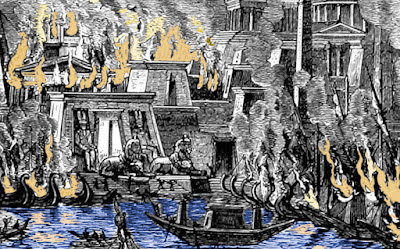 |
| A fanciful modern engraving of the Library of Alexandria aflame. |
It is a common theme these days to hear folks opine about how the glories of ancient science were snuffed out ignominiously by triumphalist, fanatical Christians sometime in the Dark Ages. Normally, specific instances of this destruction are not called out, save for the case of Hypatia of Alexandria who has been elevated by modern audiences to a sort of proto-feminist demi-goddess of science for her slaying at the hands of a Christian mob.
Yet, for those who maintain the trope that Christianity was responsible for the destruction of centuries of amazing scientific advancements wrought by Greco-Roman civilization, please allow me to present this interesting tidbit.
There is a great, encyclopedic work of the Byzantine middle ages called the Suda. The Suda is a lexicon of Greek terms which was compiled in about the 10th century AD. Far from a mere word-list, the Suda contains definitions and context for the terms listed (over 30,000 of them all told) and includes toponyms, the names of persons, and biographies of numerous ancient and medieval figures. It seems to have been created from a variety of ancient sources, many of which are now no longer extant. For more about this massive work of ancient scholarship, and the brilliant efforts of many dedicated contemporary scholars to make it accessible to everyone, see The Suda Online.
I recently ran across a random passage in James Partington’s 1957 book entitled, A Short History of Chemistry. In this book, Partington explains that little is known today about ancient chemistry because much of what was written down did not survive antiquity. He says that the word “Chemistry” first appeared in a Roman edict in which all books of the Egyptians in Alexandria on the topic of chemeia are ordered to be burnt. Partington explains that the chemeia refers to the making of gold and silver, or what we would think of today as alchemy, which Partington points out is nothing more than the word chemeia with the Arabic article al affixed to it. Partington intimates that his source for this information is the Suda.
So off to the Suda Online I went. Lo and behold, here’s the entry for chemeia (χημεία) ~
[Meaning] the preparation of silver and gold. Diocletian sought out and burned books about this. [It is said] that due to the Egyptians' revolting behavior Diocletian treated them harshly and murderously. After seeking out the books written by the ancient [Egyptians] concerning the alchemy of gold and silver, he burned them so that the Egyptians would no longer have wealth from such a technique, nor would their surfeit of money in the future embolden them against the Romans.
So did you get that? The Roman emperor who mandated that books on chemeia be burned was not Constantine, Theodosius, Justinian or any other Christian emperor. It was Diocletian, the architect of the Great Persecution of Christians himself. Recall that it was also Diocletian who decreed that Christian books should be burned, so this is certainly not out of character for him.
And yes, as we can find in other sources, there was a serious rebellion in Egypt during Diocletian’s reign. This insurrection caused him such distress that when he finally re-conquered the city after a siege of eight months, he determined that he would put everyone who supported the rebellion to the sword and would not stop killing until the blood reached up to his horse's knees. Read more in Diocletian and the Roman Recovery.
Finally, I will point out that the works of at least two authors writing on alchemy post-Diocletian have survived antiquity, largely thanks to the preservation efforts of Christian Byzantine and Muslim Arabic scholars of the Middle Ages. The first is Zosimus of Panopolis in upper Egypt of the 4th century AD. The second is Stephanos of Alexandria, a philosopher who later migrated to Constantinople in the early 6th century AD.

No comments:
Post a Comment